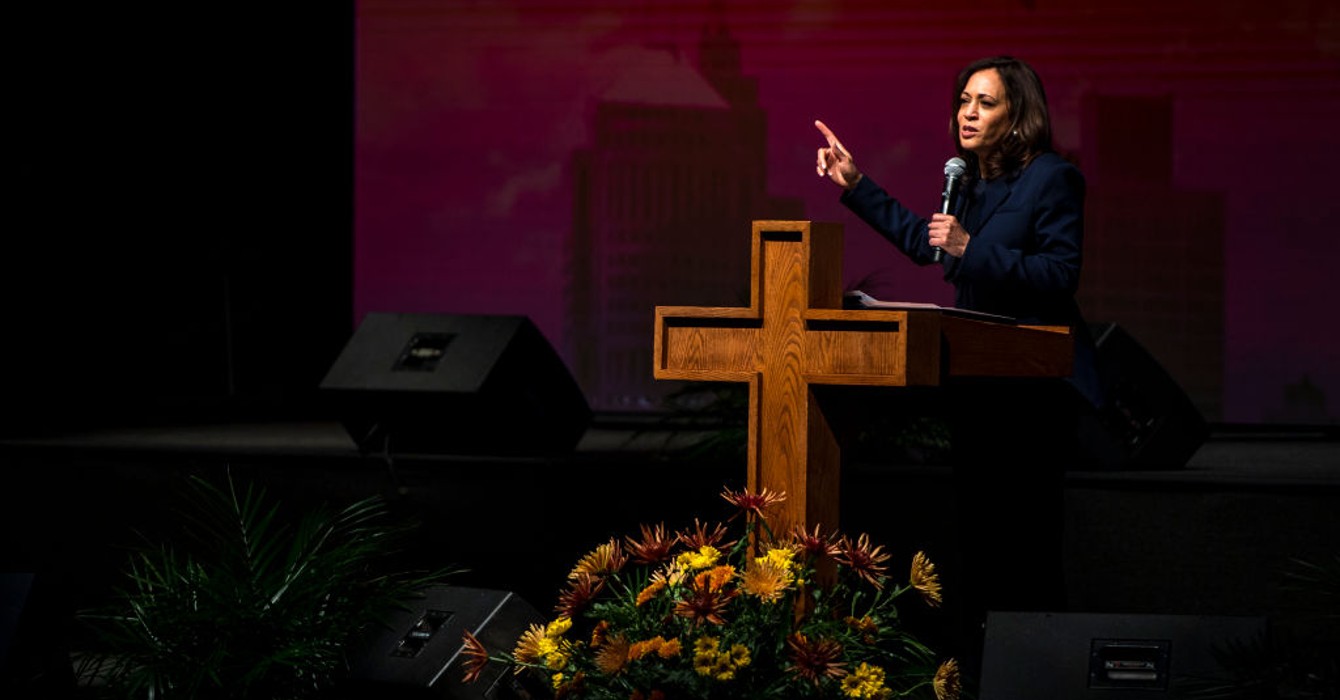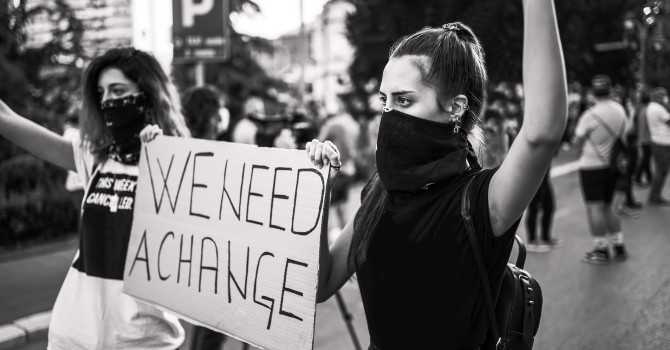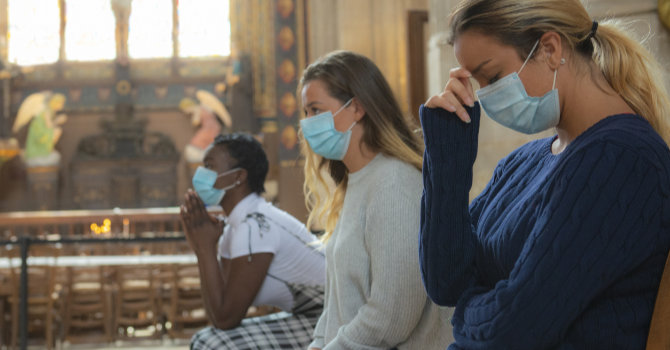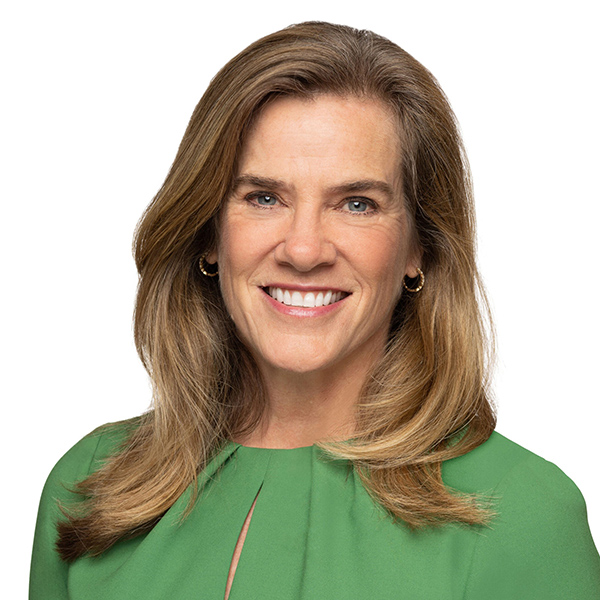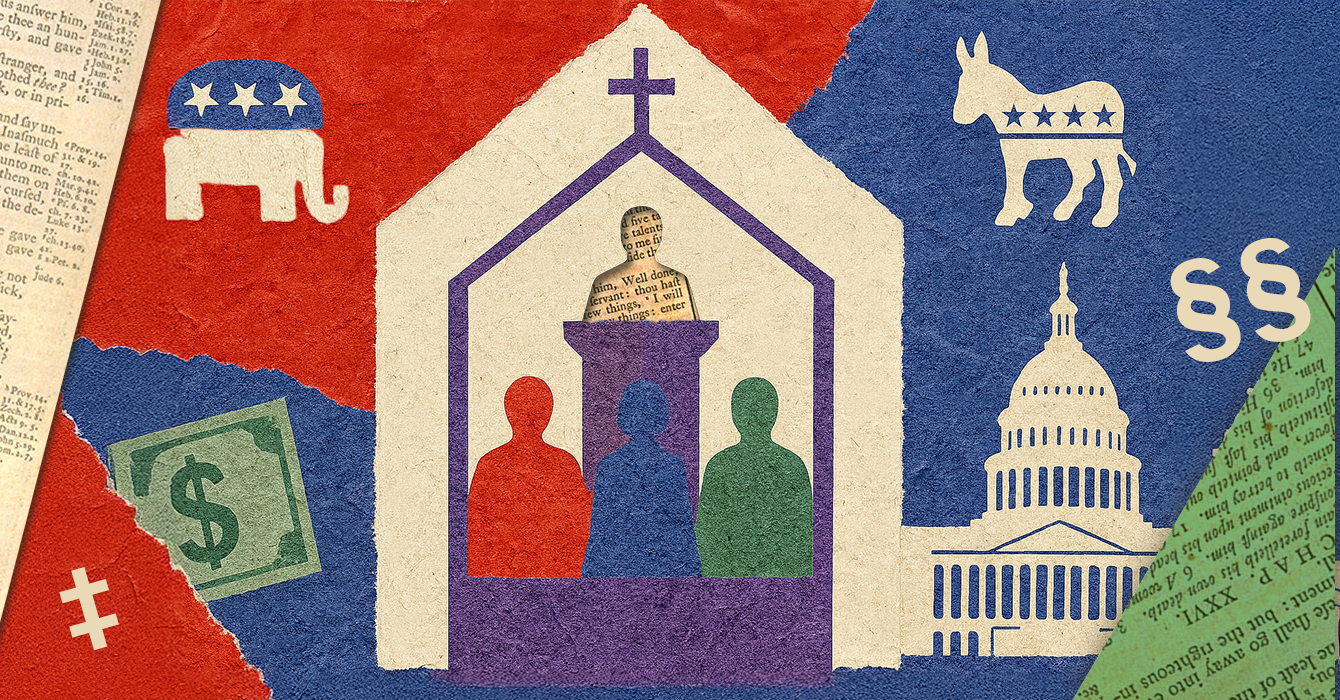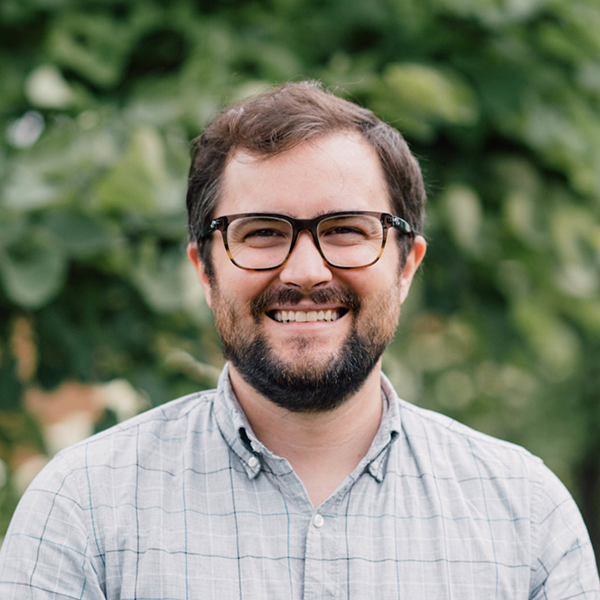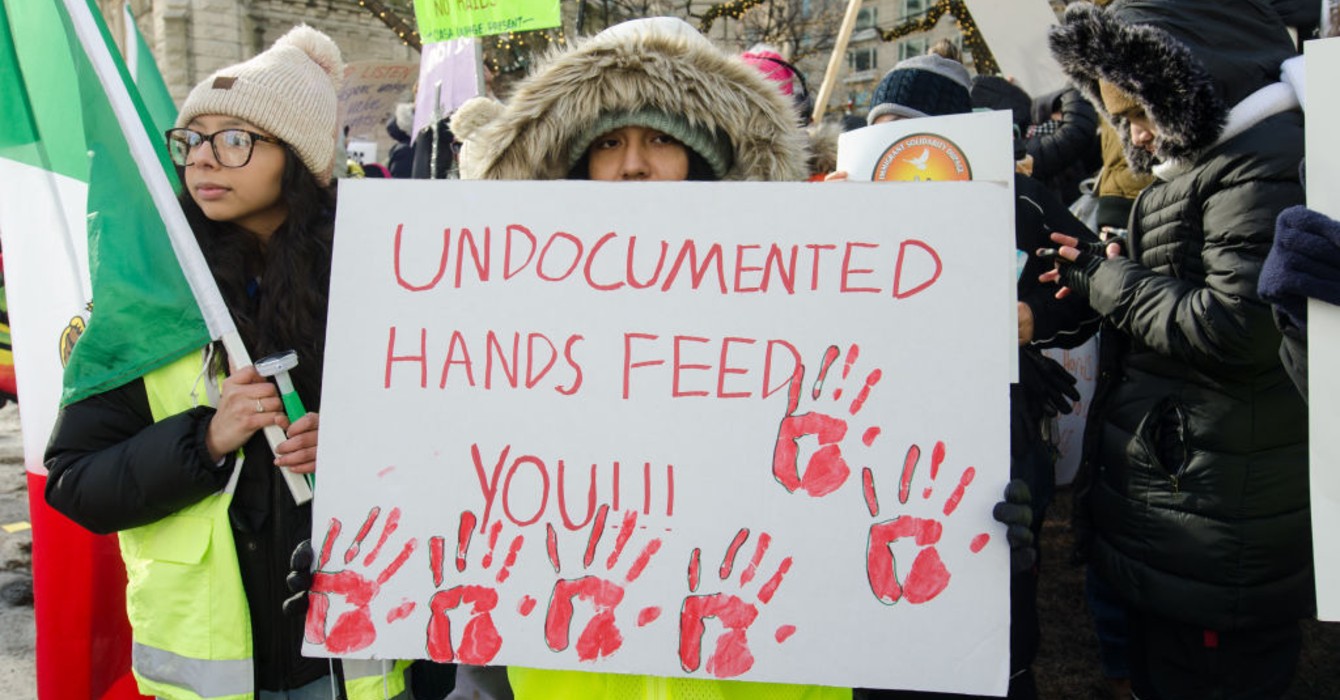The Rev. Dr. Kelly Brown Douglas recognizes the layers of reaction to Vice President Kamala Harris’ presidential bid. There is the misogynoir Harris faces, underpinned by white supremacy, which Christianity has helped flourish. There is the activism of historically Black churches, which represents a different kind of Christian witness. And, for Douglas, there is hope in what Harris’ candidacy means, demanding a world that can hold God’s creation in its fullness.
Douglas, former dean of the Episcopal Divinity School at Union Theological Seminary, was among the first 10 Black women ordained as priests in the Episcopal Church. She is canon theologian at Washington National Cathedral and visiting professor of theology at Harvard Divinity School.
She spoke with Faith & Leadership’s Aleta Payne. The following is an edited transcript.
Faith & Leadership: What do you make of the visceral reaction we are seeing to Kamala Harris’ run for the presidency? The attacks have had significant racial and misogynist overtones.
Kelly Brown Douglas: Here we have before us a Black woman, a Black Southeast Asian woman running for president as one of the major party nominees. This woman of color has located herself in the Black community; her mother raised her and her sister understanding what it meant to be Black.
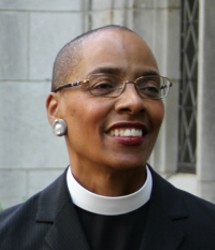
The fact that her mother raised her daughters to understand what it meant to present as Black in this nation reflects her wisdom — even as this choice signals the legacy of the one-drop rule of Black blood.
Vice President Harris has written about and talks about her Indian heritage and how her mother kept that alive and it’s still alive for her. But the recognition of what race means in this country, and the way in which race in this country has been understood as this white/Black binary or, more to the point, white/nonwhite binary — to understand this binary does not mean that one has to deny the richness of one’s heritage. Rather, it signals the need to raise your children in such a way that they can navigate the world the way it is.
Those of us who are Black parents have to raise our children to understand what it means for them to be Black and how they’re going to be treated in the world. While the world tries to set limits on them, we have to help them appreciate that there are no limits for them — at the same time being aware of the way in which they are viewed — giving them the tools to affirm their life possibilities.
Now, back to your question — what does it suggest about our nation that Vice President Harris is a major party nominee for president? When we see the way some have not been able to appreciate the richness of her racial/ethnic heritage, it says something about the way in which this country is raced along a white/Black, white/nonwhite binary. Inasmuch as the nation cannot embrace and affirm the richness of who the vice president is, then they cannot appreciate, let alone respect, the multicultural, multiethnic, multiracial richness of our very nation.
She, in her very embodied self, represents the fullness of what it means to be an American. At the same time, she represents the possibilities of who we can become as a nation — a nation where all people’s humanity is respected and indeed held sacred.
I always say we have to expand our moral imaginary about justice, which means, in the least, expanding our moral imaginary of who we are as God’s human creation. We have to catch up with God and God’s creation, and it has never been binary. Again, Vice President Harris reflects that. She embodies the nonbinary, rich reality of God’s sacred human creation.
Then, of course, beyond the racial aspect, we have who she is as a woman. Bottom line, we live in a racialized, heteropatriarchal world, with all that that means. What happens when not only do you not enjoy the racialized privilege of whiteness but you also don’t enjoy the gender privilege of maleness or the hetero privilege of being non-LGBTQ+? The world can’t hold that. We have to create a world and society that can hold what God has created.
We have Vice President Harris embodying three of those things that one gets penalized for — being nonwhite, being nonmale, also being nonbinary in her very ethnicity. And so we see the realities of this in the way in which she is attacked with the use of all the racialized, misogynist tropes, such as being “stupid,” “low IQ,” etc., not to speak of the fact that there are those who refuse to call her by her name.
These kinds of insults and attacks reflect the dehumanizing realities that are part and parcel of white racist patriarchy. This is, if you will, misogynoir writ large.
F&L: How does the church show up in this?
KBD: We know how that’s historically played out. There’s always been a religious narrative, what I call a sacred canopy, that has legitimated the dehumanization of other people. Sometimes the church provides the sacred canopy for that kind of denial of people’s humanity, that kind of oppression. We know that.
The Christian church has long provided a sacred canopy for white supremacy, of which slavery was a part. The church has long provided, deep in its bones and its theological architecture, also a sacred canopy for misogyny and for homophobia.
We continue to see it today in our public square, a Christian narrative that provides sacred legitimation for the kind of white supremacist, misogynistic, homophobic reality that continues. But that’s not new. It’s always been there.
What we always have to be aware of, as well, is that there’s always been resistance to that. Because if there’s not, you and I wouldn’t be in this conversation as Christians. There’s always been the church witnessing in a different way.
There have been times when the church has to step up more, and I think this is one of those times. It took the church far too long to begin to be worried about white Christian nationalism. It’s got to step up.
It’s about stepping up and supporting what you know to be values that are reflective of the kind of just future that God called us to.
We’ve always seen it, these two narratives in the church, and that’s what we see now.
This brings me, in fact, to the Black church. Because I do believe that the Black church, at its best, witnesses to what it means for us to be church even in this our time. When I refer to the Black church, I am talking about that part of the Black faith tradition that carries forth the legacy of faith that emerged out of the “hush harbors” of slavery. Informed by their African religious heritage and past, the enslaved knew that they were not created to be enslaved people. The point of the matter is that whether or not their enslavers and captors introduced them to Christianity — and we know that Christianity didn’t emerge on the European continent — their enslavers didn’t introduce them to God.
They knew God as free people; God created them free people. This is the faith tradition that began to be cultivated in those hush harbors, where they understood that the God that they knew in Africa was with them. Indeed, they found that God in the God of the exodus tradition. They found that God in the Jesus that was crucified.
They then crafted a different understanding of Christianity from that of their enslavers. Even as their enslavers tried to prevent them from knowing the God of the exodus, somehow the rocks cried out and the enslaved people found that God who was a liberator; they found that Jesus who was a brother, a friend, who identified with their suffering and reflected a just future where they would be free.
These oppressed, enslaved people were the ones who kept alive the truth of Christianity, the truth of a faith tradition with a liberating God at its core. In so doing, they resisted narratives that suggest that God is on the side of those that dehumanize and oppress. Central to their resistance was in fact fighting to be free. Simply put, the legacy of this Black faith tradition that was born out of the hush harbors of slavery is the very legacy that was carried forth in the civil rights struggles of the 1960s with Martin Luther King Jr. at the forefront. It is this legacy that’s what it means to be Christian, what it means to be church. The call for us who claim to be church is to step into this legacy.
F&L: What is the meaning for this election cycle?
KBD: Many have said that our very democracy is at stake in this election. Recognizing that we have yet as a nation to fulfill the promise of a democracy where the sacred humanity of all persons is guarded and respected, at best this nation continues to aspire toward fulfilling that promise. And so yes, this election is about whether or not we will continue to aspire toward our vision of being a nation where there is justice and freedom for all.
My father used to say that one of the most important things we can do is to show up for what we believe to be the right, good and just thing to do. This election is about showing up for what is right, what is good, what is just. It is about showing up for, in the words of Paul, “whatever is true, whatever is honorable, whatever is just.” The church must show up, by standing up for the true, the honorable, the just — by exhorting our members to do the same.
This is the work of the church. To show up on the public square, showing up for that which reflects the future that God promises. In the end, we the people determine the fate of our democracy and whether it will be something that this country continues to aspire to. We the people have a decision to make in this election about how we are going to show up. Yet for the church, there is no choice. To be church, to be Christian, is to show up for a future, one where all enjoy respect, justice and freedom.
F&L: Despite the misogynoir and other hateful rhetoric in this election, you’ve indicated you see hope in it as well.
KBD: This campaign reflects hope and giving people hope again. It’s not about policy differences and issues. It’s not about whether one is Republican or Democrat or whatever else one may be politically. But the time we find ourselves in now, under the cover of what’s going on in this political season, is really about making a decision, not simply about what kind of nation we want to be, but about the kind of people we are and want to be, the kind of future and world we want to have.
Pauli Murray says this: “True community is based upon equality, mutuality, and reciprocity. It affirms the richness of individual diversity as well as the common human ties that bind us together.” This is the kind of world and future we want to create, one that affirms the richness of individual diversity as well as the common humanity that binds us together.
I always say Pauli Murray was trying to create a world that could hold her in her multicultural ethnic heritage and in her nonbinary gender realities. If she could create a world that can hold her, then we have a world that can appreciate the rich diversity of God’s creation; we have a world that has caught up with God. That’s the hope that I see in the Harris campaign.

